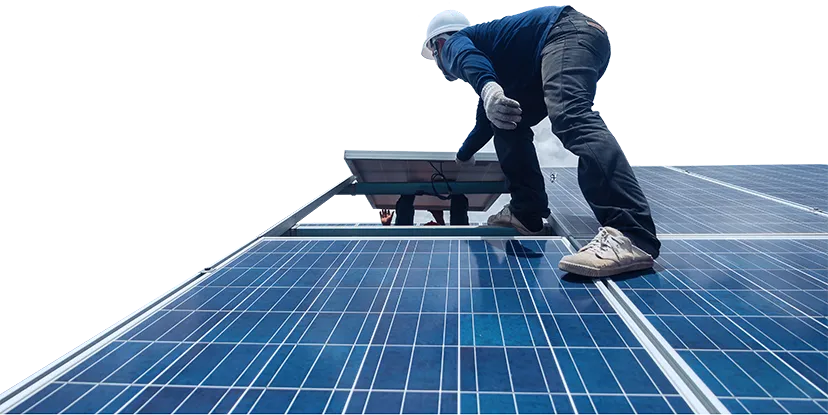Educational and Training Services
Education and training in renewable energy are crucial for the growth and development of the renewable energy industry. As the world shifts toward cleaner energy sources, skilled professionals are needed to design, install, maintain, and optimize renewable energy systems. These educational programs are designed to provide the necessary technical knowledge and hands-on experience to prepare individuals for careers in renewable energy and sustainability.
- Importance of Education and Training in Renewable Energy
Meeting Industry Demand: The renewable energy sector is rapidly expanding, and there is an increasing demand for trained professionals across various roles. This includes engineers, technicians, project managers, and analysts.
Advancing Sustainability Goals: Proper education and training contribute to meeting global sustainability targets by developing skilled workers who can deploy, maintain, and improve renewable energy technologies.
Technological Advancements: As renewable energy technologies evolve, professionals need continuous training to stay up to date with innovations in solar, wind, geothermal, hydroelectric, and energy storage systems.
Policy and Regulatory Compliance: Renewable energy professionals must also be educated about the regulatory landscape, policy frameworks, and standards that govern the energy sector.
- Key Areas of Education and Training in Renewable Energy
- Renewable Energy Technologies
These programs focus on the core technologies used in renewable energy systems. Topics include:
Solar Energy: This includes both photovoltaic (PV) systems (converting sunlight into electricity) and solar thermal systems (using sunlight for heating). Courses might cover panel design, installation, maintenance, and energy storage solutions.
Wind Energy: Covers the design, installation, and maintenance of wind turbines. Training might focus on turbine mechanics, electrical systems, and site assessments for optimal wind energy production.
Hydropower: Courses may include training on hydroelectric plants, small-scale hydropower systems, and turbine design and installation.
Geothermal Energy: Educates individuals on geothermal power plants, geothermal heat pumps, and how they leverage the Earth’s heat for energy production and heating/cooling.
Bioenergy: Involves the study of energy derived from organic materials, including biomass, biofuels, and biogas production. Training may focus on plant operation, fuel conversion, and environmental impact.
Energy Storage Systems: This includes training on battery storage (e.g., lithium-ion and flow batteries) and other storage technologies to store renewable energy for later use.
- Energy Efficiency
This area focuses on reducing energy consumption through efficient technologies and practices:
Building Energy Efficiency: Training on energy audits, insulation, lighting upgrades, HVAC systems, and energy management systems (BAS/EMS).
Industrial Energy Efficiency: Focuses on optimizing energy use in manufacturing, transportation, and large-scale industrial settings.
- Engineering and Design
Renewable energy engineering programs typically combine theoretical knowledge with practical skills. Topics may include:
Electrical Engineering: Specifically, renewable energy generation and distribution systems, grid integration, and smart grids.
Mechanical Engineering: Applied to wind turbines, geothermal systems, and the mechanics of solar energy systems.
Environmental Engineering: Focuses on reducing environmental impacts through clean energy technologies and sustainable design.
Civil Engineering: For the construction and infrastructure of large-scale renewable projects such as wind farms, hydroelectric dams, and solar fields.
- Project Management and Development
This area is essential for overseeing renewable energy projects from planning to implementation. It involves:
Project Planning: Cost estimation, site assessment, timeline development, and resource management.
Sustainability and Policy: Understanding local, national, and international policies, regulations, and incentives related to renewable energy.
Financing Renewable Projects: Focus on financial models, funding, and investment in renewable energy projects, including government incentives and subsidies.
- Environmental and Policy Training
Professionals in renewable energy must be knowledgeable about:
Environmental Impacts: Understanding the ecological and social implications of different renewable energy technologies.
Government Regulations: Knowledge of national and international policies, subsidies, and incentives promoting clean energy adoption.
Sustainability Practices: Educating professionals on the principles of sustainability and how to apply them in energy solutions.
- Education Programs in Renewable Energy
- Online Courses and Workshops
There are a variety of online platforms offering renewable energy training, such as Coursera, edX, and specialized energy education sites:
Introduction to Renewable Energy: For beginners, these courses cover the basics of renewable energy technologies and principles.
Advanced Energy Storage: Online courses focused on understanding and implementing energy storage solutions for renewable energy.
Building Energy Efficiency: Workshops and training in energy-efficient construction, retrofitting, and energy auditing.
- Vocational Training and Technical Colleges
For hands-on careers in installation, maintenance, and operation, vocational schools offer shorter-term programs and apprenticeships. These are highly practical and provide the skills necessary to work directly in the renewable energy field. Examples include:
Solar Panel Installation: Programs that teach installation techniques for solar PV systems.
Wind Turbine Technician: Training on maintaining and repairing wind turbines, including safety procedures.
Geothermal System Installer: Focus on installation and maintenance of geothermal heating and cooling systems.
—
- Key Skills Developed in Renewable Energy Training
Technical Skills: Proficiency in installing, maintaining, and repairing renewable energy systems (e.g., solar panels, wind turbines).
Project Management: Knowledge of how to plan and oversee renewable energy projects, ensuring they are delivered on time and within budget.
Data Analysis and Optimization: The ability to analyze energy performance data and make recommendations for system improvements.
Problem-Solving: The capability to troubleshoot issues in energy systems and propose solutions to enhance performance or fix failures.
Sustainability Practices: Understanding the importance of reducing energy waste, minimizing environmental impacts, and promoting eco-friendly solutions.
Knowledge of Policies and Regulations: Familiarity with the laws and incentives driving the renewable energy market, both at the local and global levels
- Career Opportunities in Renewable Energy
Graduates of renewable energy programs can pursue careers in various sectors:
Renewable Energy System Designer or Engineer: Design, develop, and implement renewable energy solutions.
Installation and Maintenance Technician: Install and maintain solar, wind, or geothermal systems.
Energy Consultant: Advise organizations on energy efficiency, sustainability, and renewable energy projects.
Project Manager: Oversee renewable energy projects from conception to completion.
Energy Auditor: Conduct audits to identify opportunities for energy efficiency improvements in buildings or industrial systems.
Sustainability Officer: Manage and implement sustainability practices within an organization or government agency.
Research and Development: Work on innovations in renewable energy technologies, such as improving energy storage or increasing the efficiency of solar panels.



